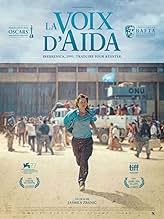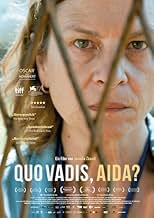CALIFICACIÓN DE IMDb
8.0/10
41 k
TU CALIFICACIÓN
Bosnia, 1995. Aida trabaja de traductora para la ONU en el pequeño pueblo de Srebrenica. Cuando el ejército serbio ocupa el pueblo, su familia está entre las miles de personas que buscan ref... Leer todoBosnia, 1995. Aida trabaja de traductora para la ONU en el pequeño pueblo de Srebrenica. Cuando el ejército serbio ocupa el pueblo, su familia está entre las miles de personas que buscan refugio en los campos de la ONU.Bosnia, 1995. Aida trabaja de traductora para la ONU en el pequeño pueblo de Srebrenica. Cuando el ejército serbio ocupa el pueblo, su familia está entre las miles de personas que buscan refugio en los campos de la ONU.
- Dirección
- Guionistas
- Elenco
- Nominado a 1 premio Óscar
- 40 premios ganados y 42 nominaciones en total
- Dirección
- Guionistas
- Todo el elenco y el equipo
- Producción, taquilla y más en IMDbPro
Resumen
Reviewers say 'Quo Vadis, Aida?' is a powerful, harrowing film about the Srebrenica massacre, praised for impactful storytelling and strong performances, especially Jasna Duricic as Aida. It critically examines the United Nations' failure and explores themes of war and survival. While lauded for emotional depth and historical significance, some criticize perceived inaccuracies and over-dramatization. It is considered an important, though challenging, film that highlights a significant historical event.
Opiniones destacadas
This is about events around the Srebrenica massacre in 1995. The UN promised that this would be a safe zone, but doesn't back up its ultimatums with action, leaving the small contingent of UN peacekeepers helpless in the face of stronger Serbian forces, who step-by-step get bolder, take over the town, and eventually the civilians seeking safety at the UN base.
I saw this as a digital screening of the Toronto International Film Festival, with writer / director Q+A. The writer put together the story based on actual transcripts, together with survivor stories. Many were composited into the main character Aida. Aida is a translator for the UN troops, and she also tries to keep safe her husband and 2 teenaged sons,. Thus she could move between the "defenders" and the defended, and tell the stories of both.
The characters are well-played and believable, and there are little touches that are illuminating: some flashbacks to pre-war life, a reference to neighbors turning against neighbors, etc. My one complaint is that, as a composite, some events seem to happen too quickly.
I saw this as a digital screening of the Toronto International Film Festival, with writer / director Q+A. The writer put together the story based on actual transcripts, together with survivor stories. Many were composited into the main character Aida. Aida is a translator for the UN troops, and she also tries to keep safe her husband and 2 teenaged sons,. Thus she could move between the "defenders" and the defended, and tell the stories of both.
The characters are well-played and believable, and there are little touches that are illuminating: some flashbacks to pre-war life, a reference to neighbors turning against neighbors, etc. My one complaint is that, as a composite, some events seem to happen too quickly.
*Why this film*- This was nominated for the 2021 Best Foreign Film Academy Award, which it lost to Another Round.
Also, I am reading America and the Problem of Hell - an account of genocides of the 20th century. The last genocide that the book extensively talks about, is of the Bosnian Muslims by the Serbians, at Srebrenica. This is set smack in the middle of that tumultuous time.
*What I liked about it* - The pacing and the scripting. It is 100 minute long and packs so much in that century. The chief protagonist, Aida, a UN translator, might be the one of the most true flesh-and-blood characters written for screen. Her personal and professional battles form the crux. The UN soldiers, tasked with enforcing truce between the Bosnians and the Serbs and the Serbian warlords, intent on capturing the city and relocating its citizens are vividly drawn. The acting is so natural that you feel at times that you are watching a documentary, rather than a thriller.
It reminded me of our very own _The Kashmir Files_ at times. The terror that you are being hunted just for your religious identity, is as real here, as it was there. The brutality, much of it off screen here, would make your fertile imagination churn up many scenarios. It is telling that this was sent to the Academy Award by the country whereas The Kashmir Files was reviled by a section of the intelligentsia and political class as conjecture and not fact based.
This is a great film and is surely going to be seared in the memories of those who choose to watch it.
Also, I am reading America and the Problem of Hell - an account of genocides of the 20th century. The last genocide that the book extensively talks about, is of the Bosnian Muslims by the Serbians, at Srebrenica. This is set smack in the middle of that tumultuous time.
*What I liked about it* - The pacing and the scripting. It is 100 minute long and packs so much in that century. The chief protagonist, Aida, a UN translator, might be the one of the most true flesh-and-blood characters written for screen. Her personal and professional battles form the crux. The UN soldiers, tasked with enforcing truce between the Bosnians and the Serbs and the Serbian warlords, intent on capturing the city and relocating its citizens are vividly drawn. The acting is so natural that you feel at times that you are watching a documentary, rather than a thriller.
It reminded me of our very own _The Kashmir Files_ at times. The terror that you are being hunted just for your religious identity, is as real here, as it was there. The brutality, much of it off screen here, would make your fertile imagination churn up many scenarios. It is telling that this was sent to the Academy Award by the country whereas The Kashmir Files was reviled by a section of the intelligentsia and political class as conjecture and not fact based.
This is a great film and is surely going to be seared in the memories of those who choose to watch it.
Nominated for Best International Feature Film at the last Oscars, Quo vadis, Aida follows a UN translator's plight to save her family from imminent death in the wake of Bosnian War and also covers the events that led to the Srebrenica massacre. A powerful, heartbreaking & devastating account of human injustice & global apathy, this Bosnian war drama is one of the best films of its year.
Written & directed by Jasmila Zbanic, the drama centres around a fictional family in the middle of a real-life conflict but through their predicament, it effectively captures the utter despair & helplessness the refugees faced, not only from their persecutors but also from their supposed saviours. Zbanic lays bare the grave incompetence of United Nations whose lack of action only ended up enabling the wholesale killings.
Zbanic makes sure the family the story focuses on looks & feels as real & authentic as possible, and the drama she conjures around them is compelling throughout. It's disturbing to watch UN delegates failing to do the one thing their organisation exists for and how they simply stood aside as mere spectators after letting the fox into the henhouse. Jasna Duricic leads from the front with an outstanding performance and she is strongly supported by the rest.
Overall, Quo vadis, Aida is a brutal, harrowing & profoundly upsetting example of its genre that provides a scorching account of the lifetime of pain & trauma that warfare leaves behind and also exposes the failure & indifference of the international council that indirectly pave the way for such atrocities. Bringing the horrors of Srebrenica to screen with cut-throat intensity and leaving us shattered with its gut-punching finale, this Bosnian war film is essential viewing by all means. In a word, unforgettable!
Written & directed by Jasmila Zbanic, the drama centres around a fictional family in the middle of a real-life conflict but through their predicament, it effectively captures the utter despair & helplessness the refugees faced, not only from their persecutors but also from their supposed saviours. Zbanic lays bare the grave incompetence of United Nations whose lack of action only ended up enabling the wholesale killings.
Zbanic makes sure the family the story focuses on looks & feels as real & authentic as possible, and the drama she conjures around them is compelling throughout. It's disturbing to watch UN delegates failing to do the one thing their organisation exists for and how they simply stood aside as mere spectators after letting the fox into the henhouse. Jasna Duricic leads from the front with an outstanding performance and she is strongly supported by the rest.
Overall, Quo vadis, Aida is a brutal, harrowing & profoundly upsetting example of its genre that provides a scorching account of the lifetime of pain & trauma that warfare leaves behind and also exposes the failure & indifference of the international council that indirectly pave the way for such atrocities. Bringing the horrors of Srebrenica to screen with cut-throat intensity and leaving us shattered with its gut-punching finale, this Bosnian war film is essential viewing by all means. In a word, unforgettable!
I am a guy from Serbia and I gave this movie 10/10 because it has really good script and it is true work of art. I wish directors from Serbia would make more films which are as good as this one.
The film covers the topic on Srebrenica genocide, which was committed in 1995 in Bosnia. It is portrayed through a family story, with Aida, a translator for the UN, as the main character.
A sad, but an important lecture on what hatred can make people do.
¿Sabías que…?
- TriviaJasna Djuricic, who plays the main role, is the wife of Boris Isakovic, who plays general Mladic. They often work together in film and theater, but in this film they don't share any scenes.
- Citas
Aida Selmanagic: We are on the list!
- ConexionesFeatured in Los 93 Premios de la Academia (2021)
Selecciones populares
Inicia sesión para calificar y agrega a la lista de videos para obtener recomendaciones personalizadas
- How long is Quo Vadis, Aida??Con tecnología de Alexa
Detalles
- Fecha de lanzamiento
- Países de origen
- Sitios oficiales
- Idiomas
- También se conoce como
- Where are you going, Aida?
- Locaciones de filmación
- Productoras
- Ver más créditos de la compañía en IMDbPro
Taquilla
- Presupuesto
- EUR 4,500,000 (estimado)
- Total a nivel mundial
- USD 813,253
- Tiempo de ejecución1 hora 41 minutos
- Color
- Mezcla de sonido
- Relación de aspecto
- 1.85 : 1
Contribuir a esta página
Sugiere una edición o agrega el contenido que falta

Principales brechas de datos
By what name was Quo Vadis, Aida? (2020) officially released in India in Hindi?
Responda

![Trailer [OV]](https://m.media-amazon.com/images/M/MV5BNjFiN2EzNDItMzBiNy00YjI4LTkwM2YtN2YxYzcwYmYzYjIxXkEyXkFqcGdeQXRyYW5zY29kZS13b3JrZmxvdw@@._V1_QL75_UX500_CR0)






























